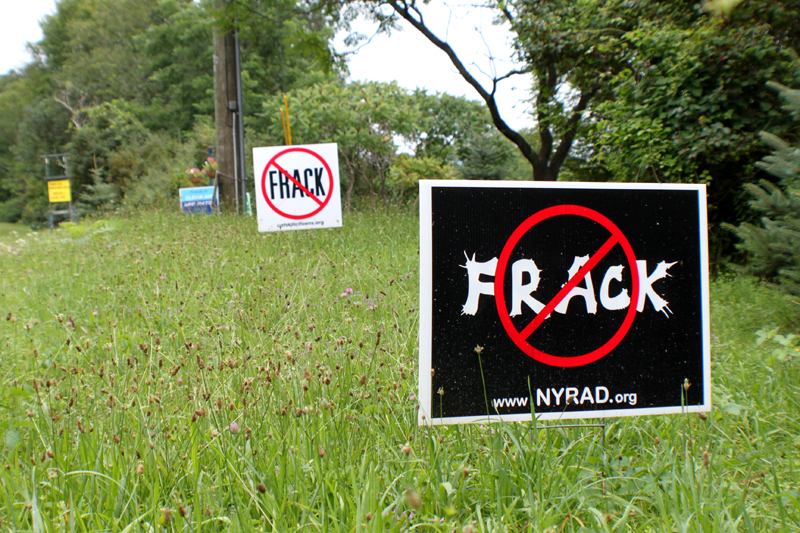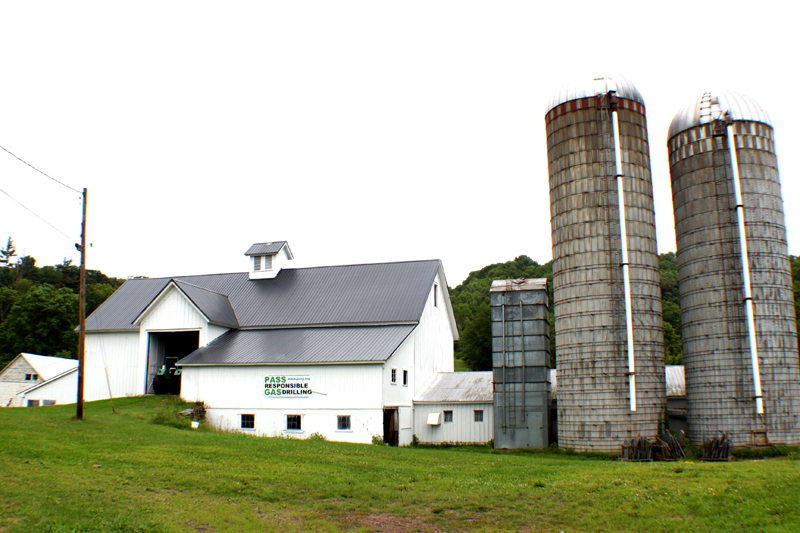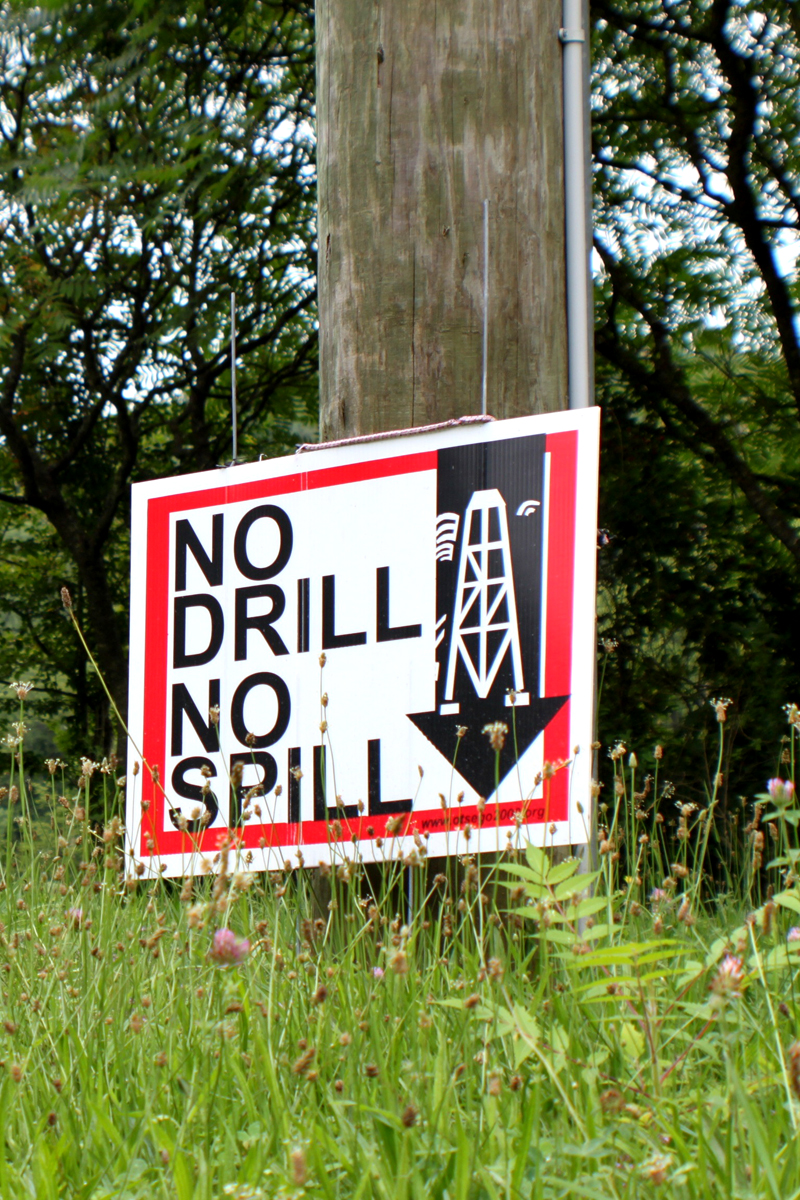
Many people in Sidney, N.Y., were outraged when the town board voted unanimously to provide a 50-year franchise to Leatherstocking Gas Co. for a natural gas pipeline at a meeting last month. Dozens shouted “Postpone the vote!” as they protested the town board’s vote in favor of the franchise. Their fear: that it will open the door to the controversial natural gas drilling technique known as fracking.
Fracking, or hydraulic fracturing, is a hot topic in upstate New York these days, where the gas drilling debate has moved to the local level.
Across the region, town boards are debating its merits and some are deciding to use zoning to ban fracking locally. And as the debate heats up, it is pitting neighbor against neighbor: landowners who want gas leases against environmentalists and others who fear fracking.
This drilling technique, of shooting water, sand and chemicals into rock to extract natural gas, requires millions of gallons of chemically treated water when it is used on deep horizontal wells.
In response to fears of water supply contamination and other environmental damage, New York has not allowed high-volume hydraulic fracturing in its enormous Marcellus shale formation up until now. But in September, the state’s Department of Environmental Conservation released new draft regulations for this drilling, and may start issuing permits for it next year.

Using ‘Home Rule’ provision, residents push to change laws
Having lost confidence that the state will prohibit high-volume hydraulic fracturing, citizen groups are petitioning their town boards for a ban by using their power to make local land-use laws. Under the state constitution’s “home rule” provision, towns control zoning, and -- in the same way they would zone out junkyards or hotels -- they are changing their laws to zone out heavy industry, including gas.
Already, more than a dozen New York towns have banned this drilling and more are planning to do so. Two of the first to do so --- Middlefield and Otsego, in Otsego County -- are home to the village of Cooperstown and its Baseball Hall of Fame.
“It really is local democracy,” said Adrian Kuzminski, a retired college professor and the founder of the environmental group, Sustainable Otsego.
It’s an area rich in tourism, of second homes and, increasingly, of organic and value-added industry such as beer, wine and cheese -- interests, Kuzminski said, that are incompatible with drilling: “It’s like playing Russian roulette with your water supply. What the gas industry doesn’t want to talk about are the losses that would occur up here.”
The fear of these losses prompted the Baseball Hall of Fame and other businesses in the Cooperstown Chamber of Commerce to issue a statement against fracking in February. One, Ommegang Brewery, has given $40,000 to the anti-fracking cause, concerned that polluted water will ruin its beer.
Landowners in favor of drilling adamantly oppose the town ban movement.
Jennifer Huntington, a third-generation farmer in Middlefield, became the first leaseholder in New York to sue her town because of its ban this September. Having already leased 379 acres of her farm to a gas company, she said she has no intention of damaging the land, but wants to access its gas.
“We bought it; we want to use it. It’s a right we feel we have,” she said. Also in September, a gas company, Anschutz Exploration Corporation, filed suit against another town, Dryden, N.Y.
The plaintiffs point to state conservation law, which both sides agree clearly gives the state -- not towns -- sole power to regulate the gas industry. But anti-drillers argue that banning industry is not regulating it, and that home rule lets towns decide whether or where they want industry, including gas.
The town bans have also been a thorn in the side of landowner coalitions, who have been waiting for the state to begin issuing gas drilling permits to cut deals with the gas companies.
Dick Downey, the 76-year-old founder of an Otsego County landowner coalition and retired schoolteacher from the Bronx, believes gas drilling would be a boon akin to the Erie Canal for the area, whose economy has been ailing, and predicts more lawsuits to come.
Usually in favor of local control, he said in this case home rule takes away his property rights by preventing him from benefiting from his land’s minerals.
“If I harm them, I owe them redress,” Downey said, “but just because they think I might harm them, doesn’t give them the right to take my property. They want my property? Pay me,” he said.
Gas drilling enters local politics
Continuing the battle, anti-drillers in the region are running for seats on their town and county boards, attempting to oust those not opposed to fracking. Their mantra: acres don’t vote; people do.
In Otsego County, more than 30 anti-fracking candidates are on the ballot, including many who have never run for office before. One candidate, Lisa Moskowitz, running for a seat on the town board of Unadilla, believes some current board members there have already leased their land to gas companies and are not moving fast enough to ban fracking.
“If in 2011 you don’t know enough, hang your head in shame,” she said.
While anti-drillers fight on the local level for town bans, a so-called “home rule bill”, seeking to clarify that towns do have the authority to zone out the gas industry, is working its way through the New York legislature. It has passed in the Assembly, but its Senate version is now stalled.
Photos by Maria Scarvalone
